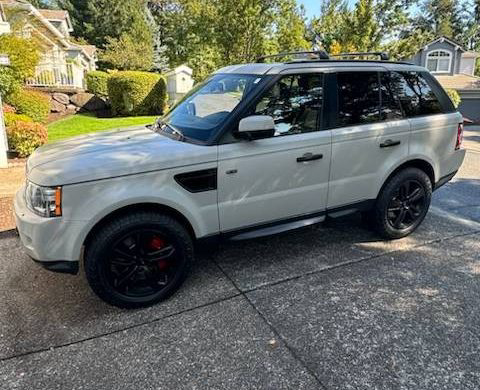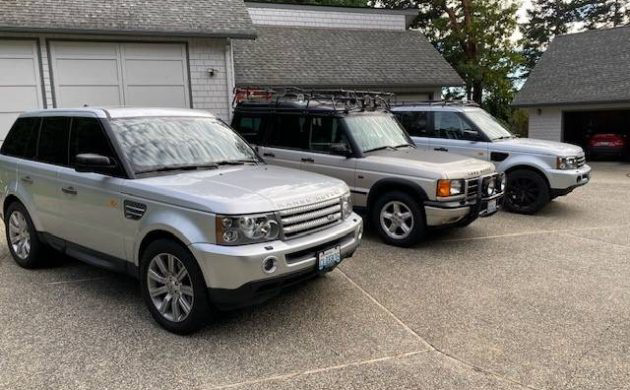A Range of Rovers For Sale
Here’s an opportunity for Rover fans, and an interesting ad to boot. We found these five Land Rovers here on craigslist, with the seller offering advice to prospective buyers in advance of even describing the vehicles for sale (the cars are complicated … prospectively repairing certain items avoids trouble …) These Rovers come from his long-held collection, are well-documented, and bookend several decades, from the 1970s to the 2000s. We’ll tackle the earlier Landies first, the oldest of which is shown above. It’s a 1974, the last year British Leyland exported to the US until the Discovery arrived under the aegis of Land Rover Ltd in 1994. Part of the third series, it has a plastic grille, an all-synchro gearbox, an alternator, and in a bow to safety requirements, a plastic dash and relocated gauges. The 2.25-liter four cylinder runs at higher compression than the earlier series, generating 70 hp. With a reported 8600 miles on the clock and no details on running condition, the price is simply listed as “negotiable”. Next up is a 1999.5 Land Rover Discovery 2. The Discovery was a move upscale, with a plusher interior, a V8 motor, and new exterior lighting. This example has 213k miles, factory paint and a $7500 price tag.
This next vehicle crops up in a few advertisements, including here under the same seller. It’s a 2006 Range Rover Sport HSE, with an asking price of $8500 ($10k in upgrades!), and 150,000 miles. Land Rover Ltd was still in charge of the Rover line, though its ownership and brands had been bounced between BMW and Ford since 1994. Land Rover’s mission had always been “off road first, luxury later”, but the Sport was a whole new approach: it carved out a performance niche in the offroad SUV market. Its genesis was a concept introduced in 2004 called the Stormer (though we can really trace it back to the first time a V8 was installed in a Rover engine bay – anyone know the year and the derivation of that engine?). The Sport was introduced in 2005 with a naturally-aspirated or supercharged 4.4-liter Jaguar V8 engine and loads of complex electronically-controlled ride and steering features. This one is sans supercharger, but if you had your heart set on the faster model….
…. the remaining Range Rovers on the docket are both supercharged. One is a 2006 Range Rover Sport Supercharged model with 60,000 miles in “near mint condition” for $12,500. Curiously, the seller mentions that the “insurance company spent $15,000 on mechanical repairs” – a comment I can’t quite decipher. (“Insurance company” expenditures wind through this entire listing, so that’s worth a clarifying phone call.) The other is a 2013 Range Rover Sport Supercharged example with 72,000 miles, in a chalk white wrap with mechanical upgrades for $27,500. Both these supercharged SUVs will be seriously quick – the question is, can the new owner keep them running that way. Which of these would you choose?
Auctions Ending Soon
 2006 Ford Mustang Saleen S281 SCBid Now23 hours$15,000
2006 Ford Mustang Saleen S281 SCBid Now23 hours$15,000
 2002 Subaru Impreza WRXBid Now3 days$100
2002 Subaru Impreza WRXBid Now3 days$100
 1975 Chevrolet Corvette ConvertibleBid Now4 days$3,000
1975 Chevrolet Corvette ConvertibleBid Now4 days$3,000
 1964 Ford F-100 Camper CustomBid Now4 days$2,000
1964 Ford F-100 Camper CustomBid Now4 days$2,000
 2006 Jeep Wrangler SportBid Now5 days$7,500
2006 Jeep Wrangler SportBid Now5 days$7,500




Comments
The oldest one.
I agree. The others are either money pits or soon will be. Land Rovers are fine for their first owner, who after about five years would trade it in or sell it so the next owner foots the repair bill.
Just like all expensive European vehicles, nothing but money-pits after they are out of warranty.
The only one desirable to me is the oldest the rest are over priced money toilets.
I bought a 73 Series 3 which was delivered in cardboard boxes. It is definitely not a complicated vehicle. Simple to work on and tough, Keep off hard surfaces in low-range 4Wheel drive though. Beware of salt, the frames rot.
They still have contests in Great Britain where two (or more) teams drive on to the field, tear their Land Rovers apart, carry the components a prescribed distance (or over a bridge, etc), and then reassemble the vehicle. The first to drive off the field wins. I also believe that I read an article long ago where teams of members of the Royal Engineers were each given an entire Land Rover in factory new parts boxes and had to assemble the entire vehicle from scratch, like a 1:1 scale model car (no glue required). They really are simple vehicles. I have seen a video of one disassembled and floated across a river to be reassembled on the other side.
The plastic grille on the Series III was a big disappointment in Australia I have read, as the galvanized steel mesh grille on the earlier Series Land Rovers was perfect for cooking dinner out in the bush. On my Series IIA, if you removed the two screws holding the LR logo at the top, the grille came off and you were ready to go. I also had a Range Rover Classic, SWB, coil springs, second owner. There is some truth to the relationship between length of ownership and amounts at the bottom of repair invoices. I sold it after the fun was over and before the headaches began. The rest of these Rovers are of no interest.
This is either the most interesting descriptions or funniest postings . . . maybe both ??? Regarding length of ownership and size of routine maintenance and repair bills . . . the same could be said for many vehicles like BMW, Mercedes, Mini . . . great engineering (??) but horrible reliability and cost of ownership.
The Rover V8 was first used in 1970 in the original Range Rover Classic. Used until 2004. Also the first Rover imported to the USA after the Series models were no longer imported into NA after 12/311973, was the 1987 RRC, not a 1994 Discovery 1
Correct on the motor, derived from the Buick 215; thanks for the clarification on the importation of Rover to the US.